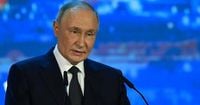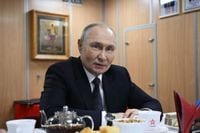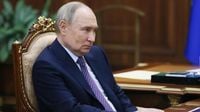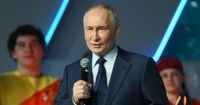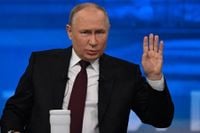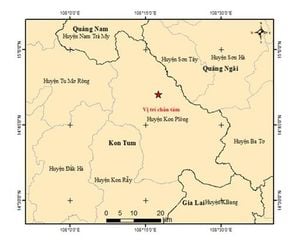In a striking development in the ongoing conflict in Ukraine, Russian President Vladimir Putin has proposed the establishment of a temporary administration in Ukraine prior to peace negotiations. This suggestion comes amidst separate negotiations being conducted by the Trump administration in the United States, which seeks to facilitate a ceasefire and ultimately end the war that has been raging since 2022.
According to reports from Reuters, Putin's remarks were made during a discussion where he reiterated his long-standing claim that Ukrainian President Volodymyr Zelensky is no longer the legitimate head of state, following the expiration of his five-year term in May 2024. This assertion has been a focal point of Russian rhetoric, aimed at undermining Zelensky's authority.
Putin's proposal for a temporary administration aligns with his assertion that “Russia does not know who it should sign any agreements with on the Ukrainian side.” He suggested that this administration could be established under the auspices of the United Nations, the United States, European countries, and other partners. The goal, he stated, would be to facilitate elections and the formation of a new government, thereby paving the way for peace talks.
However, the White House has firmly responded to Putin's suggestion, emphasizing that the governance of Ukraine is determined by its constitution and its citizens. A spokesperson from the National Security Council reiterated that the legitimacy of any government in Ukraine is derived from its legal framework and the will of the Ukrainian people.
The context of Putin's comments is significant, as they come at a time when the Trump administration is engaged in complex negotiations with both Ukraine and Russia. These discussions aim to halt the ongoing hostilities that have resulted in significant loss of life and displacement since the full-scale war began in 2022.
It is important to note that elections in Ukraine have not been held due to legal restrictions that prohibit organizing them during wartime. According to Ukrainian law, the president’s term is extended until a new head of state is elected, which can only occur after the conclusion of martial law. This legal framework has led to the current political impasse, with Zelensky's mandate being legally valid, as affirmed by a resolution passed by the Ukrainian parliament in February 2025.
This resolution, which garnered support from 268 deputies, explicitly states that presidential elections will be announced only after the war has ended and lasting peace has been achieved. It further asserts that Zelensky's mandate is legal and unquestioned by the nation, countering Kremlin narratives that seek to delegitimize his presidency.
Putin's call for a temporary administration is not without precedent. He referenced past instances of external governance under UN auspices in regions such as East Timor, New Guinea, and the former Yugoslavia, suggesting that such a model could be applied in Ukraine. However, he also noted that this is merely one option among many, indicating the fluidity of the situation.
In a related statement, Putin expressed his belief that Trump “sincerely wants to end this conflict for a number of reasons,” reflecting a perception that the U.S. administration may be open to exploring various pathways to peace.
As the situation continues to evolve, the Ukrainian government has yet to publicly respond to Putin’s latest remarks. The lack of an immediate reaction may indicate a strategic pause as officials assess the implications of Putin's proposal and the ongoing negotiations.
While the international community watches closely, the dynamics of the conflict remain complex, with multiple stakeholders involved and differing narratives shaping the discourse. The prospect of a temporary administration raises significant questions about sovereignty, legitimacy, and the future of Ukraine's political landscape.
As the Trump administration navigates its diplomatic efforts, the outcome of these negotiations could have far-reaching consequences not only for Ukraine but for the broader geopolitical landscape in Eastern Europe. The tension between maintaining national sovereignty and the potential for international oversight presents a challenging dilemma for all parties involved.
In conclusion, Putin's suggestion for a temporary administration in Ukraine underscores the ongoing complexities of the conflict and highlights the fragile state of governance in war-torn regions. The international community's response, particularly from the United States and Europe, will be crucial in determining the next steps toward a peaceful resolution.
